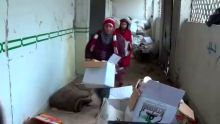"We are about to die or be arrested." That's the tragic prognosis for thousands of anti-Assad rebels, humanitarian workers and innocent children and adults left in Aleppo as Russian-backed Syrian forces close the noose around the city.
More World News Videos
Battle for Aleppo 'at its end'
The Syrian army says it is in the 'final stages' of recapturing Aleppo after a sudden advance that has pushed rebels to the brink of collapse.
Some hope emerged on Monday from a last-ditch attempt by the US and supporters to establish free passage out of Aleppo under United Nations oversight for those trapped under air and ground bombardment.
But Moscow was quick to reject it, saying agreement could not be reached because the US was insisting on "unacceptable terms".

Diplomatic sources in Geneva, Switzerland, reported that progress towards any deal was slow.
Even if agreement for safe passage were reached, that's hardly cause for optimism. Russian President Vladimir Putin has reneged on countless deals and ceasefires, leaving Washington red-faced and those trapped in Aleppo to their dire fate at the hands of Syrian forces waging a scorched-earth strategy.
Some analysts believe Mr Putin has been encouraged to go harder in Aleppo because he regards US President-elect Donald Trump as a friend. Mr Trump has said that he does not like how the US supports anti-Assad rebels. While he does not like Mr Assad, Mr Trump says the Syrian leader – and by inference his backers including Mr Putin – are at least fighting to eradicate Islamic State.
The telling point in the early months of next year will be whether Mr Trump and his likely top diplomat, secretary of state nominee and current Exxon Mobil chief executive Rex Tillerson, allow Moscow freedom to back Mr Assad's assault on all rebel groups in Syria, not just on IS. Mr Tillerson received the Order of Friendship from Mr Putin in 2013 for his work on oil in Russia.
As the political fears rise, the humanitarian crisis worsens. Syria's state-run TV channel reports that more than 70,000 of eastern Aleppo's estimated 275,000 residents fled in recent days. Most went to government-held western Aleppo.
Those who remain are split between US-supported groups that want a free passage deal and the Islamic hardliners who want to fight till the death.
Either way countless people will die in the final assault on Aleppo as diplomats work for a breakthrough in Geneva. The alternative to staying until the end is, as local medical council accountant Yasser Hmeish told The New York Times, to face a perilous future in the hands of President Bashar al-Assad's forces.
The hardline Syrian government and mainly Shiite forces from Iran have been waging war with the explicit support of Moscow. Civilians have been killed and their homes destroyed as the Alawite Assad forces try to stop an uprising by mainly Sunni rebel groups, some of which are backed unofficially by the United States but others of which are closer to Islamic State.
The war has cost more than 400,000 lives across Syria since March 2011, according to the United Nations. Millions have been left homeless. Scores of thousands have fled to mainland Europe.
Yet even as Aleppo buckles to the Assad forces, his focus on that battle has weakened the fight elsewhere, and especially in the ancient city of Palmyra where IS claims to have clawed back control.
In neighbouring Iraq, too, unpredictability is producing worrying results. The largely Shiite Iraqi army had been making solid progress in driving the IS out of the nation's second-largest city, Mosul, albeit with the Sunni radicals wreaking havoc on civilians and the city as they retreated. While the US claims the Iraq government and its allies have killed more than 2000 IS fighters in Mosul since the terrorist group took the city two years ago, the Sunni rebels are again fighting back.
To make matters worse, even if the Iraqi government took Mosul, it would still have to deal with Kurdish fighters who battled alongside the official forces but remain heavily committed to an independent Kurdish state in the north. Neither Baghdad or Turkey wants that. Indeed, a breakaway Kurdish separatist group called the Kurdish Freedom Falcons claimed responsibility for a double bombing that left 39 people dead outside a soccer stadium in Istanbul on Sunday.
The crisis across the Middle East is, if anything, becoming more complex and dangerous for the US and, as such, allies like Australia. A valid concern is that Mr Trump's relationship with Russia will hinder rather than help the search for containment.














